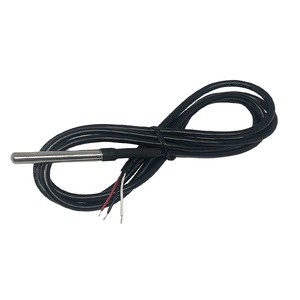
RK520-02 CE Certified Soil Temperature Humidity Moisture Electric Conductivity EC Meter Sensor For Soil Testing


Wholesale Price Thin Film Good Price Flexible Ntc Infrared Pt100High Wifi Water Temperature And Humidity Sensor For Air Fryer























Temperature sensors are fundamental components in the realm of electronics, playing a crucial role in a myriad of applications. These sensors come in various forms, each designed to accurately measure and respond to changes in temperature. The category of wholesale temperature sensor encompasses a broad range of devices, from simple thermistors to sophisticated infrared sensors, catering to the diverse needs of industries and hobbyists alike.
Within the wholesale market, temperature sensors are categorized based on their sensing elements and response patterns. Common types include thermocouples, which are widely used for their wide temperature ranges and durability, and Resistance Temperature Detectors (RTDs), known for their precision. Additionally, semiconductor-based sensors like Negative Temperature Coefficient (NTC) thermistors offer high sensitivity, making them ideal for precise temperature control tasks.
The application of temperature monitoring sensors spans across various sectors. In the automotive industry, they are vital for monitoring engine and cabin temperatures to ensure optimal performance. In residential and commercial HVAC systems, temperature control sensors are key to maintaining comfortable and energy-efficient environments. Furthermore, in the manufacturing sector, industrial temperature sensors are essential for process control, ensuring product quality and safety.
The construction of temperature sensors often involves materials that respond predictably to temperature fluctuations. For instance, thermocouples typically use two different metals joined together, while RTDs rely on pure metals like platinum. The features of these sensors, such as their temperature range, accuracy, and response time, are tailored to their intended use. Electronic temperature sensors often integrate advanced materials and technologies to enhance their functionality and reliability in complex systems.
The advantages of sourcing wholesale temperature sensor options are manifold. They provide the backbone for systems that require consistent and accurate temperature readings. Their versatility allows for deployment in environments ranging from the frigid zones of cryogenics to the intense heat of furnaces. Moreover, the availability of bulk temperature sensors ensures that businesses can maintain an adequate inventory to meet demand without interruption.
Choosing the right temperature detection sensor involves considering the specific requirements of the application, such as the temperature range, environmental conditions, and required accuracy. It is crucial to select sensors that align with the system's needs to ensure efficient and reliable performance. The vast selection available in the wholesale market provides buyers with the flexibility to find the appropriate sensors for their unique applications.